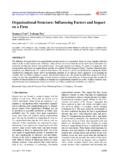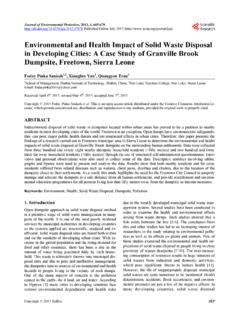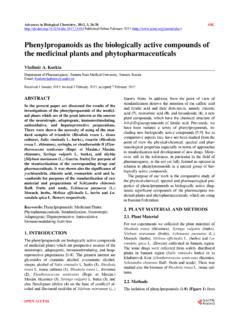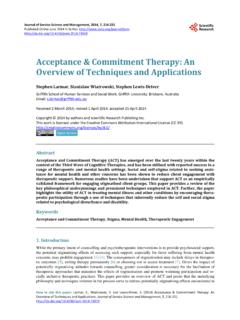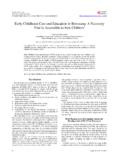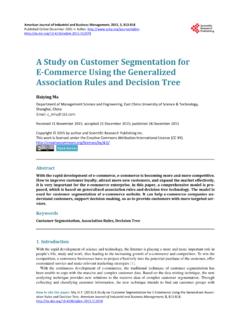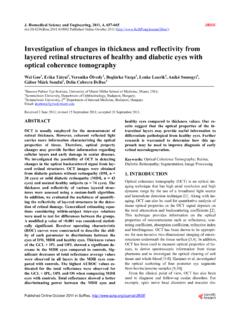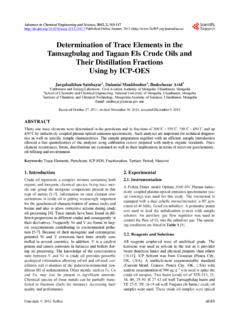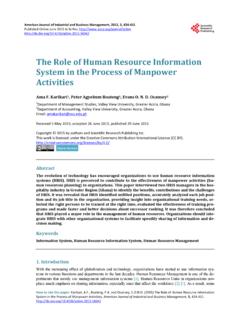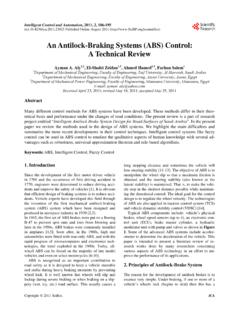Transcription of The Social and Economic Challenges of the Namibian ...
1 Open Journal of Social Sciences, 2014, 2, 288-298. Published Online April 2014 in SciRes. The Social and Economic Challenges of the Namibian Children of the Liberation Struggle at Berg Aukas Camp in Grootfontein, Otjozondjupa Region Dorthea Nanghali Etuwete Shiningayamwe1, Rakel Kavena Shalyefu2, Alex Tubawene Kanyimba2. 1. Department of Recognition of Prior Learning, Namibia Training Authority, Windhoek, Namibia 2. Department of Life-Long Learning and Community Education, University of Namibia, Windhoek, Namibia Email: Received 25 February 2014; revised 26 March 2014; accepted 2 April 2014. Copyright 2014 by authors and Scientific Research Publishing Inc. This work is licensed under the Creative Commons Attribution International License (CC BY). Abstract Despite efforts to address the Economic Challenges and provide a Social safety net for orphans and vulnerable children, Namibia is still faced with Social and Economic Challenges . The aim of this study is to explore the developmental context that underpins the Social and Economic Challenges of the Namibian children of the liberation struggle at the Berg Aukas camp in Grootfontein in the Otjozondjupa Region.
2 Data were collected by means of in-depth interviews with the Namibian Children of the Liberation Struggle and analysed by means of a case- and content-oriented analysis. The results of the study show that Children of the Liberation Struggle are faced with Social and Economic hardships. The Social hardships include dropping out of school, teenage pregnancies and traumatic events such as illness, stigma and discrimination, isolation and loneliness, poor family structures, and lack of adult support and guidance. The Economic hardships relate to lack of financial assistance to further their studies and follow aspired careers. The socio- Economic chal- lenges refer to lack of Social support, lack of counseling, lack of personal income to sustain career development and unfamiliarity with Namibian government policies. The study recommended psychosocial counselling and re-orientation of supportive policies that would provide Social safety nets for these children.
3 Keywords Economic ; Social Challenges ; Namibian Children; Vulnerable Children; Liberation Struggle How to cite this paper: Shiningayamwe, , et al. (2014) The Social and Economic Challenges of the Namibian Children of the Liberation Struggle at Berg Aukas Camp in Grootfontein, Otjozondjupa Region. Open Journal of Social Sciences, 2, 288-298. D. N. E. Shiningayamwe et al. 1. Introduction Namibia is one of the largest countries situated on the south-western coast of Africa [1]. Destabilisation, war and the policy of apartheid imposed on Namibia by the governments of Germany and South Africa respectively be- tween 1884 and 1990 had a negative Social and Economic impact on the lives of Namibians because it caused extreme poverty and Social displacement [2]. The efforts taken by the new Namibian government that was formed on 21 March 1990 entailed a radical national programme to reverse the effects of apartheid, destabilisa- tion and war through national policies and affirmative action programmes.
4 The context of Namibia's Social and Economic transformation efforts is described in the Namibia Vision 2030, a long-term policy document for national development, which was published in 2004. The Namibia Vision 2030. hopes to create a prosperous, industrialised Namibia, developed by her human resources, enjoying peace, harmony and political stability [3]. Prior to the Namibia Vision 2030, the context of Namibia's Economic and Social transformation was being pursued through the National Development Plans (NDPs, 1, 2, & 3) and the National Budgetary Framework [4]. Currently, the Namibia Vision 2030 is being implemented through a me- dium-term document for national development, called NDP 4. Since the independence of Namibia, Social and Economic transformation has been observed. The Bank of Namibia's ninth Annual Symposium Publication reports that Economic development is respectable in Namibia although volatile. It states further that Namibia is one of the very few countries in Sub-Saharan Africa that maintains a Social safety net for the elderly, the disabled, war veterans, orphans and vulnerable children [4].
5 Despite the plans and strategies in place, Namibia is still being challenged by Social and Economic problems [4]-[6]. These Challenges deserve attention, because they will re-emerge time and again in national policies which endeavour to reverse the injustices of apartheid, destabilisation and war. Against the backdrop succinctly described above, the aim of this study was to investigate the developmental context that underpins the Social and Economic Challenges of the Namibian Children of the Liberation Struggle (CLS) from 1990 until 2008. To achieve this aim, the background is sketched first by referring to Namibian co- lonial history and the efforts of the Namibian government to address the plight of the Namibian CLS. Thereafter the problem and research questions being addressed are unpacked. This is followed by a theoretical framework, in which the key concepts and theory that form the thrust of the study are elucidated. The research methods, strategies and design are explained, as well as how the narrative and case-oriented design were operationalised in the study.
6 The data are then presented and interpreted, applying the ecological theory of child development. The CLS narratives depict development context that underpins the Social and Economic experiences at different levels of the ecological systems theory of child development. The emerging themes are discussed and measures to be taken are suggested to improve the plight of the CLS. The implication of the results of the study towards the government policies targeting the CLS is explained. 2. Background of the Study Namibia led a liberation struggle against the German colonial occupation from 1884 to 1914 and the South Af- rican colonial occupation from 1915 to 1990 [7] [8]. The authorisation to end Namibia's foreign occupation and domination was issued by the United Nations (UN) Security Council Resolution 435 in 1978, implemented on 1. April 1989 and supervised by the United Nations Transition Assistance group (UNTAG) [9]-[12]. This period marked an important milestone in Namibian history, because about 43,000 exiled Namibians were repatriated to their motherland.
7 This repatriation included children who were born in Cuba, Yugoslavia, Czechoslovakia, An- gola, Germany, Zambia, Tanzania and Zambia or raised in these countries by exiled soldiers and refugees of the liberation struggle [13]. Since their arrival in Namibia, the CLS have been given various names, such as SWAPO Kids , Struggle Children , Exile Kids and Returnees Children [14] [15]. In 2008, the so-called Exile Kids made national headlines by gathering in huge numbers country-wide to demonstrate, calling for the Government of the Repub- lic of Namibia (GRN) to take note of their plight and heed their complaints. They demanded identity documents, jobs and employment, better educational opportunities, vocational training, and financial assistance to improve their Social and Economic conditions. In response to the plight of the so-called Exile Kids, the South West Africa Peoples' Organisation (SWAPO), led by the GRN, took a Cabinet Decision, No. 17 , to use the term Children of the Liberation Struggle (CLS) to refer to the Exile Kids [10].
8 The same Cabinet Decision included the establishment of a joint ministerial committee. The Ministry of Youth, National Service, Sport and Culture 289. D. N. E. Shiningayamwe et al. (MYNSSC) was tasked to chair and direct the registration process of all the CLS and address their demands. The Namibian government has put in place efforts intended to address the Social and Economic plight of the Namibian CLS, supported by the Namibian Exile Kids Association (NEKA), whose mission it is to engage the Namibian government in the recruitment process of the Namibian CLS and to address all their needs by reinte- grating them into society as productive and proud citizens, considering their unique diverse needs and circum- stances. Despite these Social arrangements, some of the Namibian CLS continue to camp illegally in Windhoek and in various parts of Namibia, irrespective of transportation arrangements and promises to attend to their plight [4] [16] [17]. The thrust of this study is to trace the developmental context of the associated socio-eco- nomic Challenges encountered by the Namibian CLS who have been camping at Berg Aukas since November 2011.
9 In particular, it focuses on the Namibian CLS born and raised in Angola, Czechoslovakia, Sierra Leone, Cuba, Zambia and Russia, because existing literature on Namibian CLS focuses more on the socio- Economic experiences of children from the German Democratic Republic (GDR), with a lesser focus on the socio-eco- nomic experiences of CLS from the above-mentioned countries. 3. Statement of the Problem The Namibian CLS have been demonstrating and camping at the Ministry of Veteran affairs in Windhoek and at several SWAPO offices country-wide since 2008. They have been demanding job opportunities, better educa- tional opportunities, identity documents, financial assistance to start businesses and re-integration into Namibian society [18]. The Newspaper reported that Exile Kids took issue with the government for allegedly not catering to their needs, as some of them were orphaned when their parents died in exile during the country's liberation struggle [18].
10 The reporter further referred to the CLS's behaviour as a serious public concern and labelled them spoiled and undisciplined kids . Therefore, the research problem being investigated in this study rests on the developmental context that underpins the Social and Economic Challenges of the CLS. The following research questions were developed to address the research problem: What are the Social Challenges of the Namibian CLS at the micro-level stage of child development? What are the Social Challenges of the Namibian CLS at the meso-level stage of child development? What are the Social and Economic Challenges of the Namibian CLS at the exo-level stage of child development? What are the Economic and Economic Challenges of the Namibian CLS at the macro-level stage of child de- velopment? What are the Social and Economic aspirations of the Namibian CLS? How do the Namibian CLS plan to address their Social and Economic Challenges ? 4. Theoretical Framework The concepts Social and Economic and the Namibian Children of the Liberation Struggle are resurfacing in Namibia's current national development issues.
